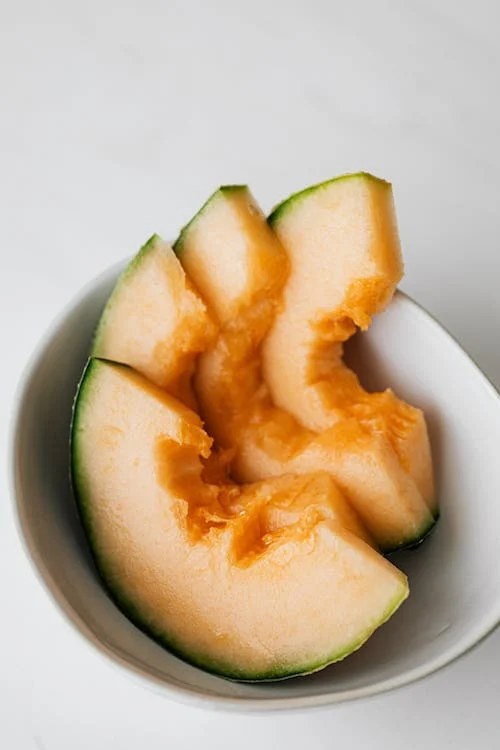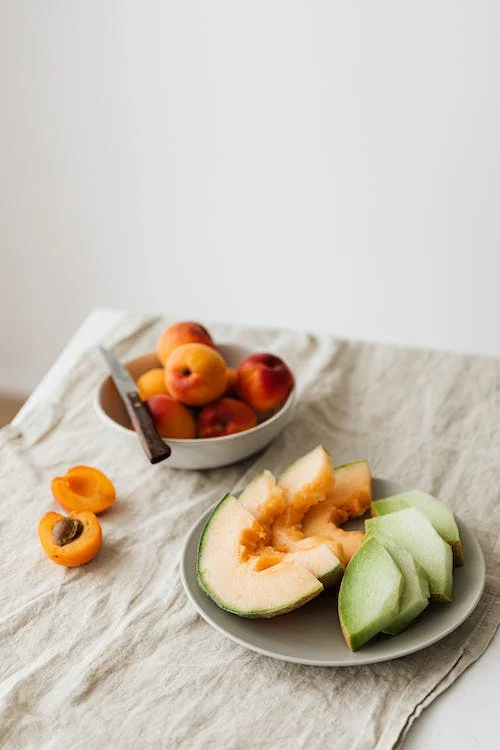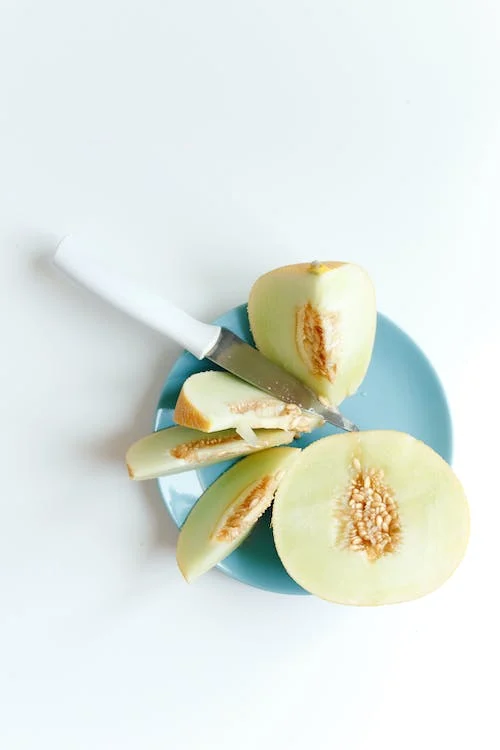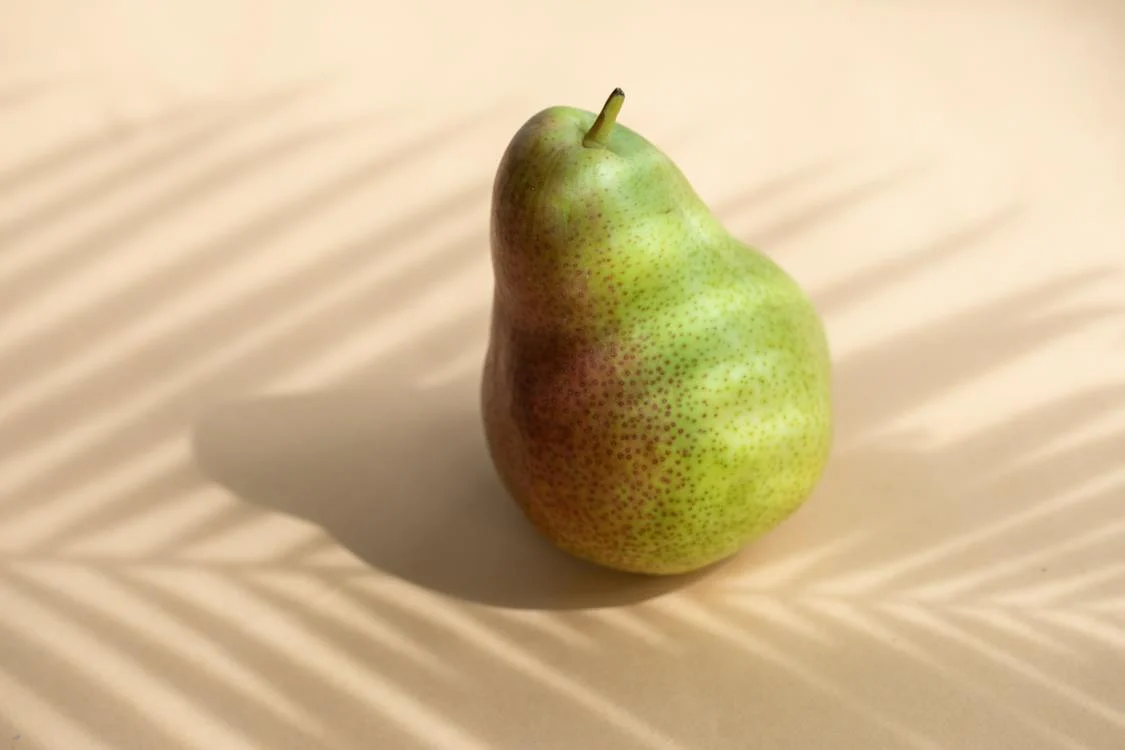As backyard vines and produce bins overflow with juicy melons of all types, it’s only natural to wonder: can dogs eat melon varieties like watermelon, cantaloupe and honeydew too?
The short answer is yes – melon can be a safe and healthy occasional treat for dogs! When properly prepared by removing rinds and seeds first, melons offer great nutritional benefits from hydration to vitamins for canine companions.
However, as with any human food treat, moderation and monitoring for reactions remains key. We’ll cover melon prep tips plus best melon choices and portion sizes for dogs below.

Are Melons Good For Dogs?
Let’s start with why melons earn a spot on the approved human food list for canines. At 92% water content, melons provide stellar hydration – even better than a bowl of water for many dogs. Melons also contain traces of nutrients beneficial in moderation, including:
- Vitamin A
- Vitamin C
- Potassium
- Fiber
In particular, cantaloupe and honeydew melon deliver the lion’s share of nutritional value. This makes them the prime melon picks for occasional doggie treats.
Just be sure to always scoop out the seeds first!

Can Dogs Have Watermelon?
The quintessential summer picnic fruit, refreshing, red watermelon has plenty of fans in the canine department too. When preparing watermelon for dogs:
- Choose ripe, red fleshed varieties
- Remove all rinds and seeds
- Cut melon into small bite-sized cubes
Then you can add a few pieces to their meal bowl or freeze into tasty cold treats on hot days. Just introduce new foods gradually and avoid letting Fido gorge on this sweet treat.

Can Dogs Eat Cantaloupe?
Like its watermelon cousin, cantaloupe melon offers similar benefits when shared occasionally and properly prepared.
To serve cantaloupe to a dog:
- Pick ripe, in-season melons
- Scoop out seeds and rind
- Chop melon into small pieces
- Mix a few bites into their kibble
Thanks to its stellar vitamin content and smooth, easily digestible texture, cantaloupe makes a great choice for training treats as well.

Are Honeydew Melons Safe For Dogs?
Rounding out the most commonly enjoyed melon varieties, you’ll also often spot webbed green honeydew melons mingling in summer fruit bowls. And they earn approval for canine consumption too.
To make honeydew melon dog-friendly:
- Ensure ripeness before cutting into it
- Remove all rind and seeds
- Chop melon flesh into bite-size pieces
- Mix sparing amounts into kibble or serve chilled
With its sweetness and high water content, honeydew melon serves dogs similarly to cantaloupe and watermelon when portion sizes stay conservative.
Can Dogs Have Melon Rinds or Seeds?
While melon flesh offers a healthy treat, what about all those scooped-out seeds, rinds and fibrous pulp remnants? Are those OK for dogs to gnaw on too?
Melon Parts to Avoid
❌ Seeds – Risks intestinal blockage or upset
❌ Rinds – Tough to digest, may cause obstruction
❌ Fibrous pulp – Can irritate digestive tract
Always compost the leftover remnants. The flesh contains all the valuable nutrition for dogs anyhow.
How to Prepare Melon for Dogs
Prepping perfect melon pieces for your pup takes just a few quick steps:
- Pick ripe, fresh in-season melons
- Wash outer rind before slicing
- Slice melon in half and remove all seeds
- Use a melon-baller or spoon to scoop flesh into chunks
- Discard all peel, rind, seeds and fibrous pulp
- Chop melon balls into smaller bite sizes
- Refrigerate in sealed container up to 3 days
Then simply mix a few melon bites into your dog’s bowl to provide a sweet hydration boost!
How Much Melon Can Dogs Eat?
While most dogs love melon, moderation prevents dietary issues. Follow these serving guidelines:
- Small dogs: 1-2 small melon chunks at a time, 1-2x/week
- Medium dogs: 3-4 melon cubes, 2-3x/week
- Large dogs: 5-6 melon pieces, 3-4x/week
Always start slow with new foods. Monitor stool health and reduce melon if soft stools or diarrhea occur.
Can Dogs Have Melon Everyday?
While the occasional melon treat benefits most dogs, daily servings aren’t recommended. Too much can lead to:
- Digestive upset
- Weight gain from excess sugar
- Potential long-term kidney issues
Stick to a few servings weekly. Also rotate melons with other fruits and hydrating vegetables like cucumbers or carrots for variety.
Melon Safety Tips
While melons score as a veterinarian-approved people food snack for dogs, a few final safety tips include:
- Avoid melon feeding if obesity or diabetes issues exist
- Never allow access to rinds or seeds
- Introduce new foods slowly and monitor reactions
- Prevent gorging – sticky sugars make melon easy to overindulge!
Follow these guidelines and melons can be a fun occasional treat combining nutrition with hydration for your dog.

The Verdict: Can Dogs Have Melon?
In summary, here’s the final word on whether fresh melon varieties are fit for canine consumption:
🟢 Yes, dogs can eat some melon in moderation!
When properly prepared by removing rinds and seeds, a few cubes of watermelon, cantaloupe or honeydew make a healthy hydrating snack. Just avoid overdoing sugary servings.

Melon FAQs
Still have questions before sharing this summery fruit bounty with your pup? See below:
Q: What type of melon is safest for dogs?
A: Cantaloupe and honeydew melons offer more nutritional benefits than watermelon. But all three make good options when fed properly in moderation.
Q: Can dogs eat melon rinds?
A: No. The tough outer rinds are difficult to digest and can cause an intestinal blockage. Always remove before feeding melon flesh.
Q: Are melon seeds toxic for dogs?
A: Not toxic, but the hard seeds can cause obstructions or upset digestion when swallowed whole. Always scoop out seeds first.
Time to share the melon fun with your furry best friend! Just follow proper preparation and portion advice. Happy National Watermelon Day!


